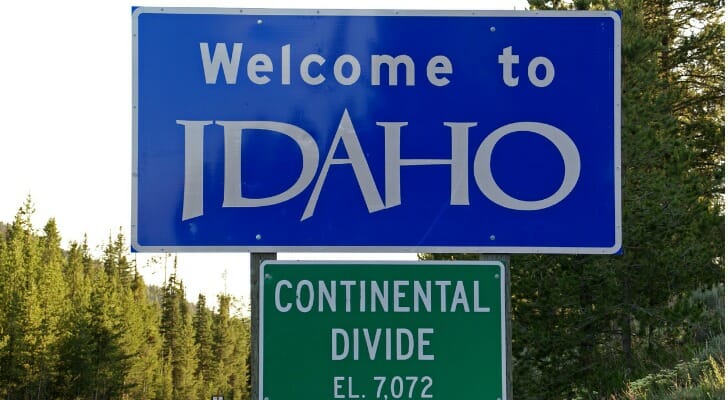
Idaho has no state-level estate tax. Idahoans with estates of a certain size may still have to worry about the federal estate tax, though. This guide walks Gem State residents through the facts and figures they need to know about the estate tax and other relevant taxes as they begin planning their estates. Estate planning isn’t easy though, so you may want to find help in the form of a financial advisor. Try using SmartAsset’s free matching tool to get paired with advisors who serve your area.
Idaho Estate Tax
There is no estate tax in Idaho. It is one of 38 states that does not levy an estate tax.
What Is the Estate Tax?
Sometimes known as the “death tax,” the estate tax applies to the estate of a person who recently died. The estate tax is levied before it is passed on to the deceased’s designated heirs. Only estates that are worth a certain amount are subject to the estate tax. The exact threshold varies based on which entity is levying the tax.
Don’t confuse the estate tax with the inheritance tax. The inheritance tax applies after an estate is distributed to a person’s designated heirs.
Idaho Inheritance and Gift Tax

Idaho also does not have an inheritance tax. Inheritance laws from other states may apply to you, though, if a person who lived in a state with an inheritance tax leaves something to you. In Kentucky, for instance, the inheritance tax applies to all in-state property, even for out-of-state inheritors. If someone who lives out of state leaves you money or property in their will, check the local laws so you don’t end up in trouble for missing a tax payment you should have made.
Idaho does not levy a gift tax either. The federal gift tax has an exemption of $18,000 for each gift recipient in 2024, up from $17,000 in 2023. If you give more than $18,000 to any one person in a calendar year, you must declare it on your tax return. It will decrease your lifetime gift tax exemption of $13.61 million and your federal estate tax exemption.
Federal Estate Tax
Idaho has no estate tax. If your estate is large enough, you still may have to worry about the federal estate tax though. There is an $13.61 million million exemption for the federal estate tax for deaths in 2022, up from $12.92 million in 2023. The exemption is portable for married couples, meaning a couple can apply both spouses’ exemptions to their estate. With the right legal steps, a married couple can protect up to $27.22 million of their estate.
Estates with values greater than the exemption amount will owe estate tax to the federal government. A table of estate tax rates, which top out at 40%, is provided below.
Here is an example: Let’s consider an estate worth $15.55 million that belongs to an unmarried individual. To determine the total estate tax burden, you’ll first need to subtract the $13.61 million exemption, leaving a taxable estate of $1.94 million. The first $1 million has a base tax payment of $345,800. An additional 40% is owed on the remaining $940,000 million, which totals $376,000. Add that figure to the base rate and you’ll get the total estate tax burden for this estate, which is $721,800.
Federal Estate Tax Rates
| Taxable Estate* | Base Taxes Paid | Marginal Rate | Rate Threshold** |
| $1 – $10,000 | $0 | 18% | $1 |
| $10,000 – $20,000 | $1,800 | 20% | $10,000 |
| $20,000 – $40,000 | $3,800 | 22% | $20,000 |
| $40,000 – $60,000 | $8,200 | 24% | $40,000 |
| $60,000 – $80,000 | $13,000 | 26% | $60,000 |
| $80,000 – $100,000 | $18,200 | 28% | $80,000 |
| $100,000 – $150,000 | $23,800 | 30% | $100,000 |
| $150,000 – $250,000 | $38,800 | 32% | $150,000 |
| $250,000 – $500,000 | $70,800 | 34% | $250,000 |
| $500,000 – $750,000 | $155,800 | 37% | $500,000 |
| $750,000 – $1 million | $248,300 | 39% | $750,000 |
| Over $1 million | $345,800 | 40% | $1 million |
*The taxable estate is the total above the 2024 federal exemption of $13.61 million.
**The rate threshold is the point at which the marginal estate tax rate kicks in.
Overall Idaho Tax Picture

Generally, Idaho is tax-friendly for retirees. The state does not tax Social Security. It fully taxes retirement accounts, including 401(k) plans. Idaho also fully taxes income from private pension plans. However, the state offers a deduction on income from public pension plans for taxpayers who are age 65 and over.
Idaho’s property taxes are low, with an average effective rate of just 0.63%.
Estate Planning Tips
- If you want help with estate planning, consider working with a financial advisor. Finding a financial advisor doesn’t have to be hard. SmartAsset’s free tool matches you with up to three vetted financial advisors who serve your area, and you can have a free introductory call with your advisor matches to decide which one you feel is right for you. If you’re ready to find an advisor who can help you achieve your financial goals, get started now.
- There are a number of ways to go about setting up your estate, including wills and living trusts. Working with a financial advisor will help you decide which of these various strategies is best for your situation.
Photo credit: ©iStock.com/Maxfocus, ©iStock.com/bernardbodo